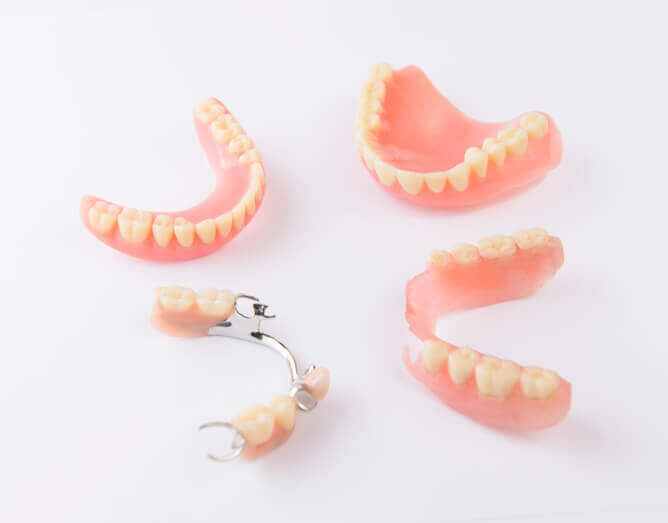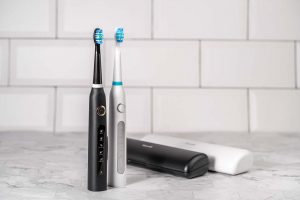If you have a large number of missing or damaged teeth, you know that it’s important to find a reliable and affordable means of replacing them. Traditionally, most people have opted to replace their missing teeth with complete or partial dentures, however, today, more and more people also consider dental implants as they are becoming more affordable. Nonetheless, complete or partial dentures are the most popular choice for replacing teeth. In fact, just under 20% of the population of Canada wear dentures and it is estimated that 25% of Canadians will need either partial or full dentures during their life.
Types of Dentures
Dentures are an affordable and effective way to replace missing teeth in a non-invasive manner (i.e. without surgery, unlike dental implants). Today’s dentures are much more natural-looking and comfortable than they used to be a few decades ago.
Some denture-wearers, however, still may find it necessary to use dental adhesive to prevent them from slipping while eating or speaking. It’s important to keep in mind that if your dentures are designed and made with care, slippage shouldn’t be an issue since when dentures fit appropriately, they tend to remain in place. As your mouth changes though, the seal between the gums and the dentures may weaken so if your dentures are not adhering to the way they once did, you should inform your dentist who will make the necessary adjustments.
Moreover, if your dentures are not properly fitted, they may actually promote sores and bone deterioration. In general, you can expect your dentures to need replacement or refitting every 5 to 7 years.
Partial Dentures
If you only need to cover gaps between healthy teeth, the best solution is having partial dentures, or bridges, made. These false teeth are attached by clasps to your healthy teeth to fill in gaps. If you don’t have healthy teeth to attach the bridge to, you may need dental implants to give your partial dentures extra stability. Your bridges may be removable or may sit in a fixed position using a crown. Bridges help maintain the appearance of a healthy smile while also keeping the remaining teeth in their proper alignment instead of shifting over time.
Complete Dentures
Complete dentures are necessary when you have no healthy teeth in your entire upper or lower arch. Once all your teeth are removed, a few months later conventional dentures can be placed in your mouth. This period of time is essential since the gums get a chance to heal properly. You do have the option of immediate dentures that can be used immediately following an extraction. However, gum tissue and bone do not have time to settle and as a result, immediate dentures will require adjustment over time. Normally, immediate dentures are considered temporary and are eventually exchanged for conventional dentures.
How are Dentures Created and Fitted?
Your dentures are created and fitted in a few dental appointments. Once your teeth are removed, an impression is made of the gums and sent to a dental laboratory. The laboratory then creates a wax version of the gum line which is used by your dentist to determine where the teeth will be positioned. Once the dentures are completed by the laboratory, your dentist will ask you to come in for a fitting to determine if they look (colour and size/shape of the teeth) and function correctly. When you and your dentist are happy with the resulting dentures, they may be returned to the laboratory for final tweaking and cleaning/polishing. This whole process generally takes a few weeks to complete and get your new bright shiny set of teeth.
After You Receive Your Dentures
Initially, when wearing your new dentures, you may notice that you speak with a lisp. This will eventually stop as your mouth adjusts to the dentures. During the adjustment period, you may also experience a minor irritation of the gums and tongue. If, however, gum irritation becomes more severe or if your dentures begin to slide around or fall out of place, then you need to contact your dentist for additional adjustments. You may also be asked to wear your dentures all the time to get used to them and to detect any possible flaws in the design. Please, keep in mind that, you should avoid hard or sticky foods – it’s better to eat soft food in small portions until you get used to your dentures.
As far as keeping your dentures clean, you should follow your dentist’s instructions on how to care for them. In addition, only use adhesive if your dentist approves. After the adjustment period, your dentures should fit comfortably in your mouth. You will be able to speak and eat with ease. And of course, you will have a bright beautiful smile.
If you have any questions regarding dentures or if you would like to find out what type is right for you, contact us today to schedule your denture consultation. Call us at 604-455-6247 or book your appointment online.






